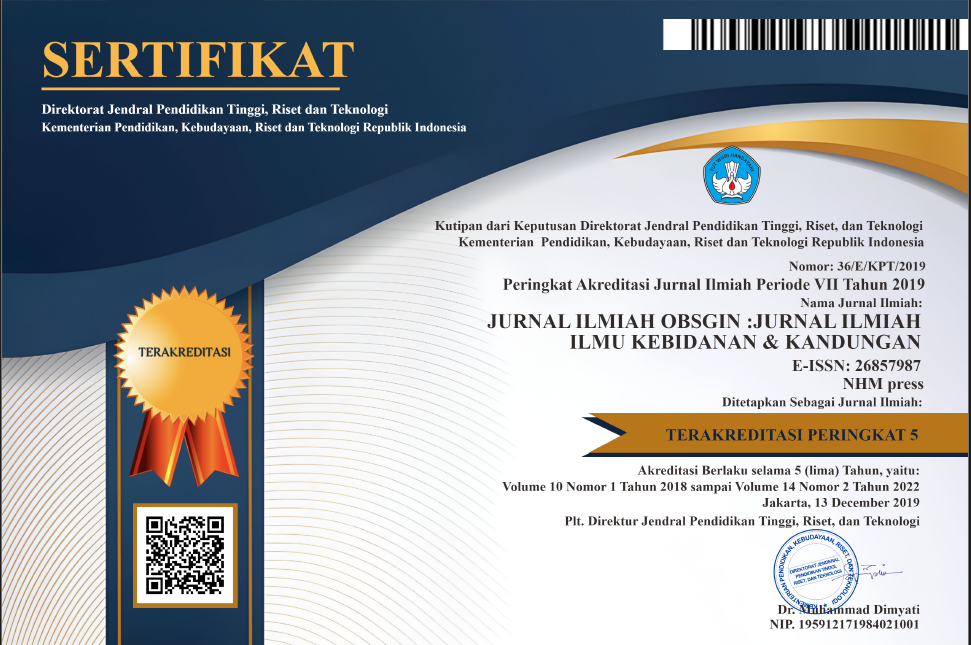HUBUNGAN PENGETAHUAN DAN PERSEPSI AKSEPTOR KB DENGAN PEMILIHAN KONTRASEPSI IUD PASCA IKUTAN SECTIO CAESAREA DI RSU SRIKANDI IBI JEMBER
Abstract
The rate of population growth in Indonesia is increasing and is becoming a serious problem. One of the activities that can be carried out is to promote long-term effective contraceptive methods. Intrauterine Contraception Device (IUD) is a method that is widely used in family planning programs in Indonesia and after Sectio Caesarea is more practical to use. This study aims to determine the relationship between knowledge and perceptions of family planning acceptors and the choice of IUD contraception after participating in a caesarean section at Srikandi General Hospital IBI Jember. The research design uses correlational analysis with cross sectional research. The study population was family planning acceptors who chose IUD contraception after having a caesarean section at Srikandi IBI Hospital Jember, from January to December 2022, with a total of 987 post-cesarean patients: 12 = 82 respondents. This sample uses non-random sampling (non-probability): accidental sampling. Data were collected using a questionnaire and analyzed using a gamma correlation test. The results showed that from 82 respondents to family planning acceptors by filling out a questionnaire and calculating the data using the gamma test, the results obtained were p-value = 0.212 from the knowledge of family planning acceptors and p-value = 6.212 from the perception of family planning acceptors where the p-value ≥ α (0, 05). It was concluded there was no relationship between the knowledge and perceptions of family planning acceptors and the choice of IUD contraception after attending a caesarean section. This research can be used as a reference for similar research with a larger sample size so that the results are more representative to be generalized to other researchers.
References
Arifin, H. S. (2017). Faktor yang Mempengaruhi Persepsi. Jurnal Penelitian Komunikasi, 21, 88-100.
Arum. (2011). Metode Kontrasepsi Sterilisasi. Graha Ilmu : Jakarta.
Asnori. (2020). Psikologi Pendidikan Pendekatan Multidisipliner (Fajar T. Septiono (Ed.); 1 st Ed.). CV. Pena Persada.
BKKBN, & Kemenkes. (2013). Survei Demografi dan Kesehatan Indonesia Kesehatan Reproduksi Remaja. Jakarta.
BKKBN. (2020). Informasi Pelayanan Kontrasepsi Keluarga Berencana.
Jakarta : Dirjen KB.
Destyowati. (2011). Hubungan Tingkat Pengetahuan Ibu tentang Kontrasepsi IUD dengan Minat Pemakaian Kontrasepsi IUD di Desa Harjobinangun Kecamatan Grabak Kabupaten Purworejo.
Dinkes Jatim. (2021). Buku Profil Kesehatan Propinsi Jawa Timur Tahun 2021. Pemprop Jawa Timur : Surabaya.
Dinkes Jember. (2020). Buku Profil Kesehatan Kabupaten Jember Tahun 2020. Pemkab Jember : Jember.
Dyah. (2011). Panduan Lengkap Pelayanan Terkini. Nuha Medika : Yogyakarta.
Erfandi. (2008). Metode AKDR/ IUD. diakses 14 April 2017. Tersedia di http://puskesmas-oke.com.
Kemenkes RI, (2022). Profil Kesehatan Indonesia Tahun 2021. Kemenkes RI : Jakarta
Kemenkes. (2013). Riset Kesehatan Dasar 2013, Laporan Nasional. Jakarta
: Balitbangkes Depkes RI.
Notoatmodjo, S. (2012). Metode Penelitian Kesehatan. Rineka Cipta : Jakarta.
Nurmalita Sari, M. H., Sopiani, A., & Irawati, A. (2020). Factors Relating to the Interest of Use MKJP (IUD and Implant) in the Village of Perigi Mekar, Ciseeng, Bogor. Journal of Midwifery Science: Basic and Applied Research, 2(1), 27–32. https://doi.org/10.31983/jomisbar.v2i1.5968.
Notoatmojo. (2003). Ilmu Perilaku Kesehatan. Rineka Cipta : Jakarta.
Patmawati. (2019). Frame Of Reference Masyarakat Madura tentang Kyai. Fakultas Pendidikan Psikolog.
Pinontoan. (2014). Faktor-Faktor yang Berhubungan dengan Penggunaan Alat Kontrasepsi dalam Rahim di Puskesmas Tatelu Kabupaten Minahasa Utara. Jurnal Ilmiah Bidan, 2(2), 91805.
Proverawati, A. dkk. (2010). Panduan Memilih Kontrasepsi. Nuha Medika : Yogyakarta.
Rindiarti, dkk. (2012). Tingkat Pengetahuan Wanita Usia Subur tentang Alat Kontrasepsi IUD di BPRB Bina Sehat Kasihan Bantul. Jurnal Ners dan Kebidanan Indonesia. Sekolah Tinggi Ilmu Kesehatan Alma Ata Yogyakarta.
Robbinns, S. P., & Judge, T.A. (2008). Perilaku Organisasi (12th Ed.).
Salemba Empat.
Saifuddin. (2006). Pelayanan Kesehatan Maternal & Neonatal. Yayasan Bina Pustaka Sarwono Prawirohardjo : Jakarta.
Sari, A. P. (2018). Keluarga Berencana dalam Perspektif Hukum. 17-36. http://eprints.ums.ac.id/id/eprint/64251
Sujayatini dan Arum. (2012). Panduan Lengkap Pelayanan KB Terkini.
Nuha Medika : Yogyakarta
Sunarsih. (2015). Gambaran Persepsi Ibu terhadap Penggunaan Alat Kontrasepsi Dalam Rahim (AKDR) di Wilayah Kerja Puskesmas Ronowijayan Kecamatan Siman Kabupaten Ponorogo.
Sutarsono, A. (2016). Hubungan Persepsi terhadap Kesehatan dengan Kesadaran (Mindfulness). Jurnal Ilmiah Psikologi Terapan.
Walgito, B. (2010). Pengantar Psikologi Umum. Andi Offset.
Wawan & Dewi. (2012). Teori Pengukuran Pengetahuan, Sikap dan Perilaku Manusia. Nuha Medika : Yogyakarta.
https://www.bps.go.id/pressrelease/2021/01/21/1854/hasil-sensus- penduduk-2020.html











